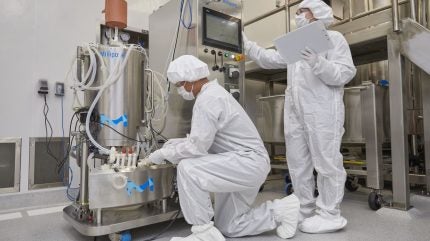
Merck (MSD) has announced the final analysis findings from the Phase III KEYNOTE-811 clinical trial evaluating Keytruda (pembrolizumab) plus trastuzumab and chemotherapy for the treatment of human epidermal growth factor receptor 2 (HER2)-positive locally advanced unresectable or metastatic gastric or gastroesophageal junction (GEJ) adenocarcinoma.
The randomised, double-blind KEYNOTE-811 trial assessed Keytruda plus trastuzumab and fluoropyrimidine- and platinum-containing chemotherapy as a first-line treatment.

Discover B2B Marketing That Performs
Combine business intelligence and editorial excellence to reach engaged professionals across 36 leading media platforms.
The trial’s dual primary endpoints were progression-free survival (PFS) and overall survival (OS), while secondary endpoints comprised objective response rate (ORR), duration of response, and safety.
Enrolling 698 subjects, the trial compared Keytruda 200mg given every three weeks in combination with trastuzumab, fluoropyrimidine- and platinum-containing chemotherapy, versus placebo in combination with trastuzumab and chemotherapy.
According to the latest data, the study met its dual primary endpoint of overall survival (OS), showing a significant improvement in patients treated with the Keytruda regimen.
The final analysis also confirmed that the Keytruda combination regimen led to a statistically significant and clinically meaningful improvement in OS in the intention-to-treat (ITT) study population, particularly those with PD-L1-expressing tumours.

US Tariffs are shifting - will you react or anticipate?
Don’t let policy changes catch you off guard. Stay proactive with real-time data and expert analysis.
By GlobalDataKeytruda’s safety profile in this trial was in line with prior studies, and no new safety signals were identified.
An earlier interim analysis had demonstrated that the Keytruda regimen met the other primary endpoint of PFS.
Following the earlier results, the US Food and Drug Administration (FDA) gave accelerated approval to Keytruda in combination with trastuzumab and chemotherapy as first-line treatment for adults with locally advanced unresectable or metastatic HER2-positive gastric or GEJ adenocarcinoma whose tumours express PD-L1.
Merck Research Laboratories’ global clinical development oncology head and senior vice-president Dr Marjorie Green said: “Patients diagnosed with advanced gastric cancer often face a poor prognosis, underscoring the need for treatment options that have the potential to extend patients’ lives.
“These overall survival results from KEYNOTE-811 are encouraging and build on the positive progression-free survival, overall response rate and duration of response data from this study.”
Last month, MSD announced positive data from the Phase III STRIDE-10 trial of its investigational pneumococcal conjugate vaccine, V116.





